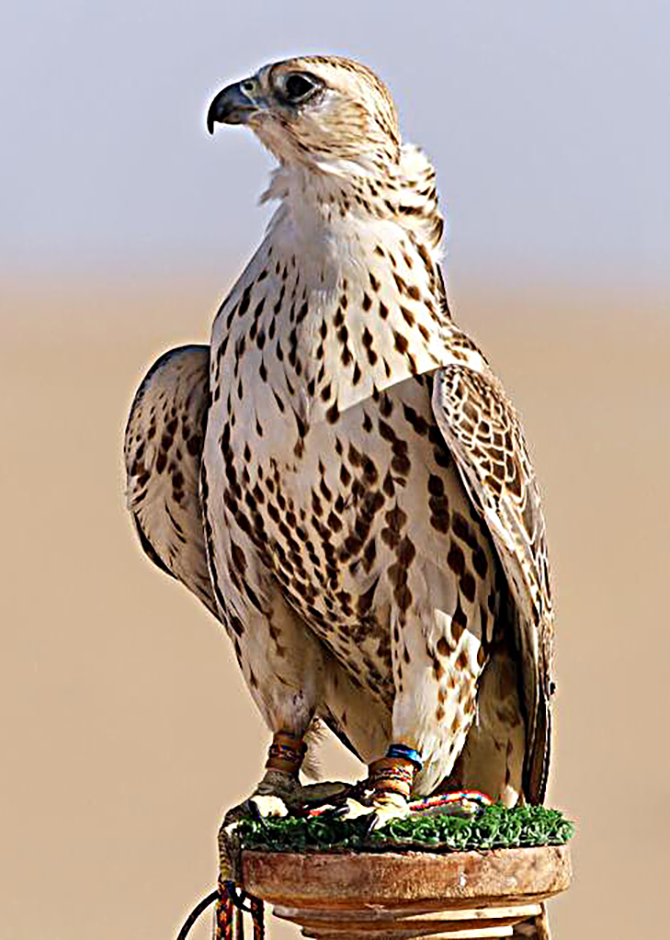JEDDAH: Over the past few decades, falconers in Saudi Arabia have emerged as pioneers in breeding and preservation as the wider falconry industry has grown exponentially since its humble Bedouin beginnings.
The Kingdom has a rich historical heritage and tradition of falconry. A common companion of a Bedouin traveler across the Arabian deserts, hunting with falcons was an integral part of the land for thousands of years as they helped provide nourishment for the weary traveler by catching prey.
In 1920, renowned American ornithologist and expert on birds, Louis Agassiz Fuertes, published an article in the National Geographic Magazine entitled “Falconry, the Sport of Kings” and described it as a “beautiful and romantic sport.”
“A hawk must be at once kind and fierce; it must be to stand the changes of climate of the owner’s country; it must be strong enough and swift enough to overtake and strike down its quarry, and intelligent enough to be able to unlearn much of its native knowledge,” Fuertes wrote in the article.

Today, falconry is one of the most interesting and lucrative sports for Saudis and many others in the region.
But it is falcon breeding that has played a key role in bringing the ancient hobby back to its old glory. Historically, wild falcons were caught at a young age, preferably less than a year old, as it could take months to train them properly as breeding became a rising interest amongst falconers and conservationists in the 1960-70s.
It became a lucrative hobby as only the fastest, most powerful, beautiful, and intelligent falcons were selected based on their distinct characteristics and bred through reputable breeders. But the selection process was not easy. Breeders will spend thousands of Saudi riyals just for training but selecting the best is an integral part of the breeding process.

Understanding the history of the bird was paramount, according to vet and wildlife conservation expert, Albara Al-Othman, who has specialized in endangered species for the past 16 years.
“It is no easy feat,” Al-Othman told Arab News. “The falcon breed is selected depending on the purpose or use, either they will be used for hunting or for contests and each one has its own categories, rules, and requirements. In beauty contests, only purebreds are allowed whereas you can find the hybrids included in the racing category.
“Falconry racing is one of the most exclusive sports and only the top birds can join. Breeding provides that for falconers.”
According to Al-Othman, it takes two years for the birds of prey to reach adulthood in order to start the breeding process and produce chicks as the mothers also play an important role.
HIGHLIGHT
In 1920, renowned American ornithologist and expert on birds, Louis Agassiz Fuertes, published an article in the National Geographic Magazine entitled ‘Falconry, the Sport of Kings’ and described it as a ‘beautiful and romantic sport.’
On Thursday, Saudi Arabia will host the inaugural International Auction for Falcon Breeding Farms at the Saudi Falcon Club (SFC) headquarters in Malham, north of the Kingdom’s capital Riyadh. The auction aims to present top-tier falcons from across the region along with some of the top breeding farms from around the world.
The auction will review the evolution of genetic biology and the process of falcon breeding that takes place on specialized farms.
Protecting falcon species in the wild is more than just a lucrative business. They are often bred in captivity, which spearheaded a larger movement to protect some of the most vulnerable birds that are on the verge of being added to the endangered list.
Al-Othman said that breeding plays a key role in preserving the numbers and the demand is high.

“One potentially negative impact of the process would be the loss of the hybrid in the wild,” he said. “They can be quite aggressive if lost. The likelihood of that happening is rare but it is a risk.”
Last December, the SFC launched the first phase of their “Hadad” program, which aims to return falcons to their natural habitats. The program will be carried out in coordination with the Special Forces for Environmental Security, the National Center for Wildlife Development, and others.
According to SFC, the birds will be monitored and their behavior studied.
“To ensure that falconers get the best out of a breed, the history of the selected bird is the most important factor as the stats count and are fundamental for the selection process,” Abdullah Shamrookh, a falconer with more than two decades of experience, said.
“The UAE, UK, Spain, and Holland are some of the top countries with breeding programs and the most famous would be crossbreeding between the Shaheen and purebred gyrfalcon. Known as Falco Peregrinus, they were selected for their speed and were very successful. It is one of the most amazing breeds found in any contest.”
Last year, a young wild Shaheen falcon, weighing 1.1 kilograms captured in Hafr Al-Batin, in the northeast of the Kingdom, was sold for more than $170,000. It was the most expensive sale of the breed, according to the SFC.
Shamrookh, who has vast experience in falconry, has started to compete in contests. As a falconer whose hobby is now turning professional, he has favored the Mountain Falco Peregrinus, known amongst falconers in the region as Al-Barbary (or the Barbary), even though it has not gained as much fame as its kin, the “Marine Falco Peregrinus.”
According to Shamrookh, falconers prefer bred falcons over wild ones as they are the ones that will likely win in contests and races.
“The upcoming auction has been the talk of the town lately and is one of the biggest that will ever be,” he said.














